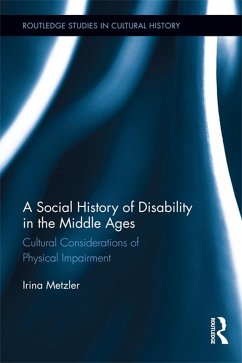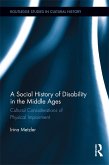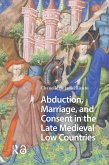This volume informs our knowledge of the topic by investigating the impact medieval laws had on the social position of disabled people, and conversely, how people might become disabled through judicial actions; ideas of work and how work could both cause disability through industrial accidents but also provide continued ability to earn a living through occupational support networks; the disabling effects of old age and associated physical deteriorations; and the changing nature of attitudes towards welfare provision for the disabled and the ambivalent role of medieval institutions and charity in the support and care of disabled people.
Dieser Download kann aus rechtlichen Gründen nur mit Rechnungsadresse in A, B, BG, CY, CZ, D, DK, EW, E, FIN, F, GR, HR, H, IRL, I, LT, L, LR, M, NL, PL, P, R, S, SLO, SK ausgeliefert werden.
"With Disability Studies on the rise in academia, Irina Metzler's comprehensive study of the cultural aspects of disability in the Middle Ages is a welcome and will be a well-appreciated addition to the field of study.Metzler's research is quite clearly exhaustive, and her use of a wide variety of sources-legal, clerical, literary-gives her work a clear sense of definitiveness. Through her thorough and meticulous consideration of the sources on the cultural ramifications of disability in the Middle Ages, Metzler skillfully argues her assertion of the liminality of the medieval disabled." -Rachel Levinson-Emley, UC Santa Barbara, USA









